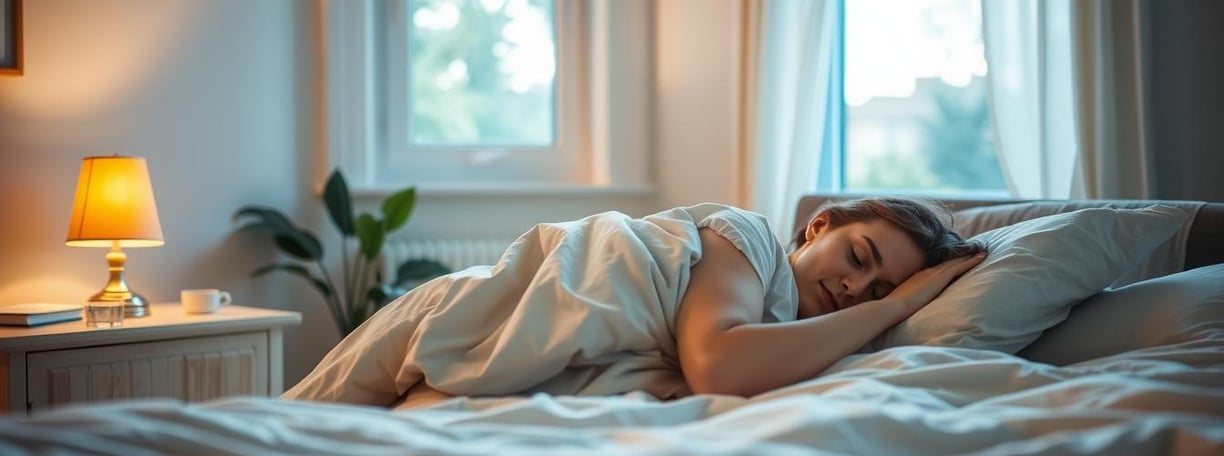Improve Your Sleep Quality with These Tips
Blog post descriptGetting a good night's sleep is crucial for overall health and well-being. According to the Mayo Clinic Staff, adopting habits that encourage better quality sleep is vital. Simple tips for achieving this include setting a consistent sleep schedule and incorporating physical activity into your daily routine


Maintaining good sleep practices can significantly enhance the quality of your rest. This includes creating a sleep-conducive environment and avoiding stimulants before bedtime. Some individuals also find that supplements like magnesium tablets can help promote relaxation and improve sleep quality.
Key Takeaways
Establish a consistent sleep schedule to regulate your body's internal clock.
Incorporate physical activity into your daily routine to enhance sleep quality.
Create a sleep-conducive environment to promote relaxation.
Avoid stimulants before bedtime to improve sleep quality.
Consider supplements like magnesium tablets to promote better sleep.
The Science of Sleep and Why It Matters
Understanding the intricacies of sleep is crucial for enhancing overall well-being. Sleep is a complex process that involves multiple stages and cycles, playing a significant role in our physical and mental health.
Understanding Sleep Cycles and Stages
Sleep is not a uniform state; it consists of different stages, including light sleep, deep sleep, and REM (Rapid Eye Movement) sleep. These stages are crucial for achieving deep sleep and improving sleep patterns. A full sleep cycle typically lasts around 90 minutes and is repeated several times throughout the night.
How Sleep Deprivation Affects Physical Health
Sleep deprivation can have severe consequences on our physical health, including increased risks of obesity, diabetes, and cardiovascular disease. Research indicates that poor sleep quality can negatively affect our immune system and overall physical well-being.
Mental Health Implications of Poor Sleep
Poor sleep can also have a significant impact on our mental health, affecting our mood, cognitive function, and emotional stability. Enhancing sleep quality is essential for maintaining good mental health and reducing the risk of mental health disorders.


Creating the Optimal Sleep Environment
Effective sleep strategies often begin with transforming the bedroom into a sleep sanctuary. A well-designed sleep environment can significantly enhance sleep quality and overall well-being. By focusing on key elements such as temperature, light, noise, and bedding, individuals can create a restful night's sleep haven.
Temperature and Ventilation Considerations
Maintaining a cool bedroom temperature is crucial for a restful night's sleep. The ideal temperature range is between 15.5°C and 19.4°C. Ensuring good ventilation helps regulate bedroom temperature and prevents the buildup of stale air.
A cooler bedroom can promote better sleep practices by creating a comfortable sleep environment. Consider using fans or adjusting your heating/cooling system to achieve the optimal temperature.


Managing Light and Noise Disruptions
Light and noise can significantly disrupt sleep patterns. To minimize these disruptions, consider using blackout curtains or blinds to block out external light sources. Earplugs or white noise machines can also help mitigate noise disturbances.
Creating a dark and quiet sleep environment is essential for effective sleep strategies. By controlling light and noise, individuals can improve the quality of their sleep.
Selecting the Right Bedding and Mattress
Investing in a comfortable mattress and suitable bedding is vital for a restful night's sleep. Choose a mattress that provides the right level of support and comfort for your body. Bedding should be breathable and comfortable against the skin.
Selecting the right bedding and mattress can significantly impact sleep practices. By prioritizing comfort and support, individuals can enhance their overall sleep quality.
Establishing Routines for Better Quality Sleep
A well-structured sleep routine can significantly enhance overall sleep quality and daily functioning. Establishing a consistent sleep schedule and bedtime routine is crucial for improving sleep patterns. This involves setting a regular sleep and wake time, even on weekends, to regulate the body's internal clock.
Consistent Sleep and Wake Schedules
Maintaining a consistent sleep and wake schedule helps regulate the body's circadian rhythms, leading to better sleep quality. It's essential to set a realistic bedtime and wake-up time that allows for 7-9 hours of sleep. Consistency reinforces the body's sleep-wake cycle, making it easier to fall asleep and wake up naturally.
Effective Wind-Down Rituals
Engaging in relaxing activities before bed can signal to the body that it's time to sleep, enhancing sleep quality. Effective wind-down rituals include reading, meditation, or a warm bath. Avoiding electronic devices at least an hour before bedtime is also crucial, as the blue light they emit can interfere with the production of melatonin, the sleep hormone.
Weekend Sleep Strategies
Maintaining sleep quality on weekends can be challenging due to changes in routine or social activities. To maximize sleep quality, it's advisable to stick as closely as possible to the weekday sleep schedule. If a late night out is unavoidable, trying to have a nap the next day rather than sleeping in late can help mitigate the disruption to the sleep schedule.
By implementing these strategies, individuals can significantly improve their sleep quality, leading to better rest and overall well-being.
Nutrition and Dietary Habits That Enhance Sleep
The food we eat has a profound impact on our ability to sleep soundly. A well-balanced diet that includes sleep-promoting foods can enhance sleep duration and quality. Nutrition plays a significant role in regulating our sleep patterns, and making informed dietary choices can be a crucial step towards achieving restful nights.
Sleep-Promoting Foods and Nutrients
Certain foods are rich in nutrients that promote better sleep. For instance, foods high in magnesium, such as dark leafy greens, nuts, and seeds, can help relax the body and prepare it for sleep. Additionally, consuming foods rich in tryptophan, like turkey and fish, can promote the production of serotonin, a neurotransmitter that regulates sleep.
Other sleep-promoting nutrients include calcium and potassium, found in dairy products and bananas, respectively. These nutrients help in relaxing the muscles and calming the nervous system, making it easier to fall asleep.
Foods and Beverages to Avoid Before Bed
Just as some foods can promote sleep, others can disrupt it. Consuming caffeine and alcohol close to bedtime can significantly impair sleep quality. Caffeine, being a stimulant, can keep you awake, while alcohol can disrupt sleep patterns, leading to poor quality sleep.
It's also advisable to avoid heavy meals and spicy foods before bedtime. These can cause discomfort and indigestion, making it difficult to fall asleep or stay asleep throughout the night.
Strategic Meal Timing for Optimal Sleep
The timing of meals can also impact sleep. Eating a large meal too close to bedtime can lead to discomfort and indigestion, negatively affecting sleep. It's recommended to finish eating at least two to three hours before bedtime to allow for proper digestion.
A light snack that includes sleep-promoting nutrients can be beneficial if you're hungry before bed. However, it's essential to avoid snacks that are high in sugar or caffeine.
Supplements and Natural Sleep Aids
The quest for a good night's sleep often leads to exploring supplements and natural sleep aids. As people seek to improve their sleep quality, various options are considered to achieve restful nights.
Magnesium Tablets: A Key to Quality Sleep
Magnesium supplements have gained significant attention for their role in enhancing sleep. Magnesium tablets can help relax the body, making it easier to fall asleep.
How Magnesium Influences Sleep Architecture
Magnesium plays a crucial role in regulating sleep architecture. It influences the body's internal clock and can help improve the quality of sleep by promoting deeper sleep stages.
Choosing the Right Magnesium Supplement
When selecting a magnesium supplement, it's essential to choose the right type. Forms like magnesium glycinate are often recommended for their bioavailability and gentle effect on the stomach.
Proper Dosage and Administration Timing
The optimal dosage of magnesium can vary, but typically, it ranges between 200-400 mg. Taking it 30 minutes to an hour before bedtime can be beneficial.
Potential Side Effects and Contraindications
While generally safe, magnesium supplements can cause side effects like diarrhea or stomach cramps in some individuals. It's crucial to consult a healthcare professional, especially for those with kidney issues.
Other Beneficial Sleep Supplements
Apart from magnesium, other supplements can aid sleep. Melatonin and valerian root are popular choices, known for their sleep-promoting properties.
Herbal Remedies for Sleep Enhancement
Herbal remedies have been used for centuries to improve sleep. Chamomile tea and lavender are well-known for their calming effects, helping to prepare the body for sleep.
By exploring these supplements and natural sleep aids, individuals can find a solution that works best for them, leading to improved sleep quality and overall well-being.
Lifestyle Factors Affecting Sleep Quality
Making conscious lifestyle choices can greatly improve our sleep quality. By understanding how different aspects of our daily lives impact our sleep, we can make informed decisions to enhance our rest.
Exercise and Physical Activity Recommendations
Regular physical activity is a crucial lifestyle factor that can significantly impact sleep quality. Engaging in moderate-intensity exercise, such as brisk walking or cycling, can help improve sleep. However, it's recommended to avoid vigorous exercise within a few hours of bedtime as it can stimulate the body. Instead, opt for relaxing activities like yoga or a gentle stretch in the evening.
Managing Stress and Anxiety for Better Sleep
Managing stress and anxiety is vital for achieving good sleep quality. Techniques such as mindfulness meditation, deep breathing exercises, or journaling can help calm the mind before bed. Establishing a consistent sleep schedule and creating a relaxing bedtime routine also play a significant role in reducing stress-related sleep issues.
Technology Use and Blue Light Exposure
The use of technology and exposure to blue light from devices such as smartphones, tablets, and computers can interfere with sleep. The blue light emitted by these devices can suppress the production of melatonin, the hormone responsible for regulating sleep. To mitigate this, it's advisable to limit screen time before bed, use blue light filtering glasses or apps, or switch to reading or listening to soothing music.
By addressing these lifestyle factors, individuals can take significant steps towards improving their sleep quality. It's about making small, manageable changes that can lead to substantial benefits in overall well-being.
Conclusion: Your Personalised Path to Restful Nights
By implementing the tips and strategies discussed in this article, you can significantly improve your sleep quality and achieve restful night's sleep. Creating a sleep-conducive environment, establishing consistent routines, and making informed dietary choices are all crucial steps towards maximizing sleep quality.
To enhance sleep duration, it's essential to adopt a personalized approach that suits your lifestyle and preferences. This may involve experimenting with different relaxation techniques, such as those involving magnesium tablets, or exploring herbal remedies to promote a restful night's sleep.
By taking control of your sleep habits and making a few simple changes, you can wake up feeling refreshed and revitalized. Start your journey to better sleep today and discover the benefits of a restful night's sleep for yourself.
Empower
Real talk on fitness, nutrition, and wellness.
Glow
© 2025. All rights reserved.
